
Trump's Immigration War Pivots To Asian Talent
If this were 1995 or 2005, perhaps conservatives really would be satisfied with policies that curbed illegal immigration while preserving the legal kind. But the Trump administration has made it crystal clear that it's opposed to all immigration, including of the legal high-skilled variety that the right used to claim to want.
On September 19, Trump issued an executive order slapping incredibly harsh restrictions on the H-1B visa program. According to the order, and to clarifying remarks made by Commerce Secretary Howard Lutnick, anyone who employed an H-1B worker would have to pay US$100,000 to the government every year that worker was employed:
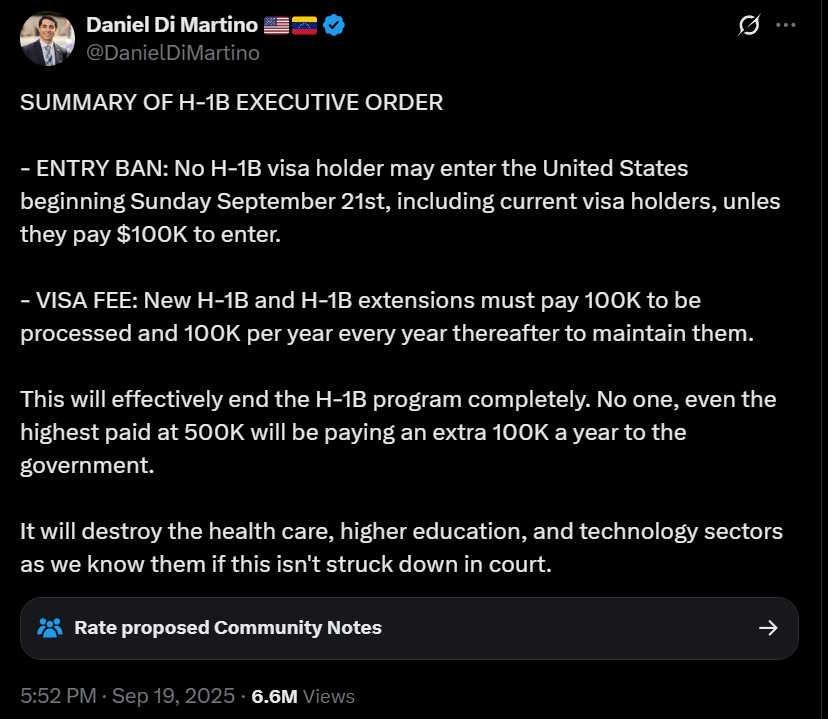
An uproar immediately ensued. It wasn't clear whether the order would hold up in court, but if it did, it would effectively kill the entire H-1B program. $100,000 a year is simply too onerous.
Killing the H-1B program would cause huge disruption to much of the US tech industry and to the university system as well. The tech industry is very international; often the people who bring key ideas to a startup are at first only able to come work in America via H-1B.
A lot of universities initially depend on H-1B visas to bring over faculty and researchers. In general, critical knowledge workers will eventually get employment-based green cards,[1] but this takes a lot of time and effort; usually, they have to come on H-1B first, and apply for green cards while working in America.
As a result, a lot of very successful and famous Americans needed the H-1b to get their start in the country:
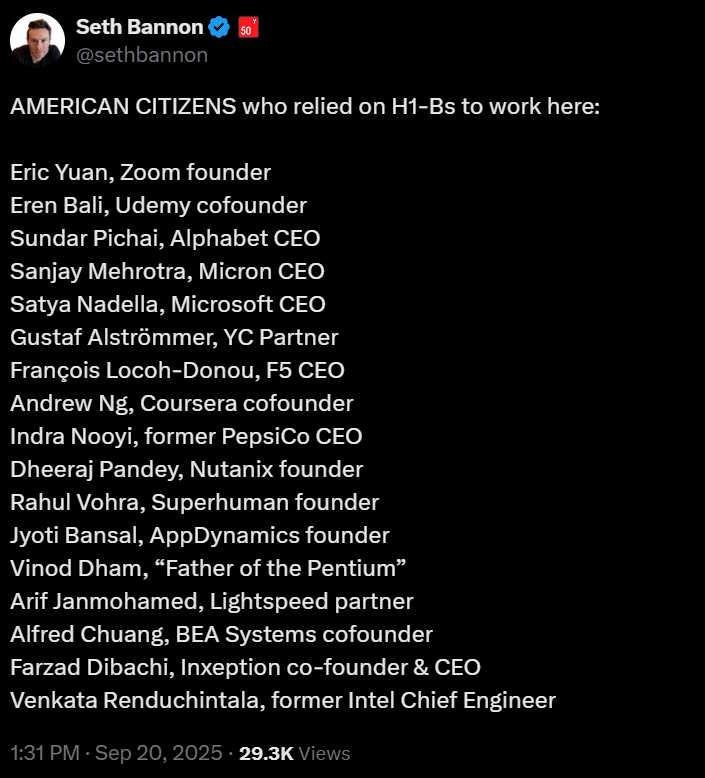
Cut off H-1B, and you cut off much of the pipeline of skilled legal immigrants to the US.
Whether or not the Trump administration was aware of the ramifications of the order will probably never be known. But the size of the uproar - which was probably assisted by some frantic behind-the-scenes maneuvering by the“Tech Right” - caused the administration to do one of the hasty backtracks for which it has become famous.
Within a day, US government agencies were tweeting that the new rule is only a one-time fee rather than a repeating one, and that it doesn't apply to existing visa holders. There was an instant wave of relief .
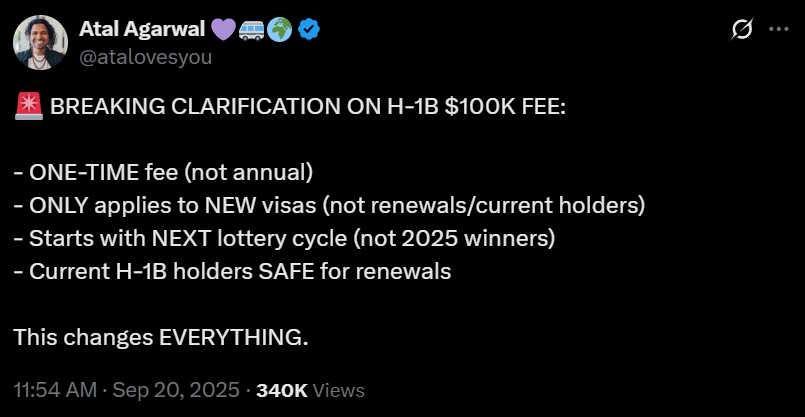
If the $100,000 fee holds up in court, it'll still place a significant burden on H-1B employers and workers [2] but not an insurmountable one.
And it looks like foreign students may be exempted from the fee, which would bias the visa program toward people who study at US universities and away from people who are hired directly from overseas. That would actually be good, since the former are especially desirable.
But in any case, the order, in whatever form, is still a significant attack on skilled immigration. And it wasn't the most egregious one we've seen in recent weeks. A couple of weeks ago, ICE raided a Hyundai battery factory in Ellabell, Georgia, arresting hundreds of South Korean workers:
The raid on the South Koreans, by all accounts, was very harsh and brutal , with various medical incidents among the detainees and frequent threats of violence by the federal agents.
The raid wasn't illegal, of course, or even against the letter of the law. These workers were not working legally (except for one who had a valid visa and was detained anyway, for some reason).
Most of them were in a legal gray area - their temporary permits allowed them to do certain kinds of work but not others. But they certainly possessed skills that were important to the build-out of a critically important US manufacturing industry.
Both of these actions were very bad, and will be detrimental to America's wealth and power. The negative impact of the raid on the Hyundai factory is obvious - the mass arrest has caused an international incident, inciting rage among the Korean populace, and prompting some Korean politicians to demand an official apology from the US.
Meanwhile, an absolutely massive amount of planned Korean investment into the US is now being reconsidered or put on hold , threatening Trump's dreams of reindustrialization.
As for the H-1B case, the program has a variety of problems. Some companies that abuse the system - hogging H-1B slots for low-value outsourcing workers, or treating H-1B employees like indentured servants. I wrote about these problems and how to fix them in a 2022 post .
Let me just quote myself a bit:
And here are a couple more papers :
Glennon (2023) also finds evidence that when we do restrict H-1Bs, it leads to more offshoring; if companies can't hire tech workers here in America, they will hire them elsewhere. This is because A) tech workers earn even less when they're working overseas, so the wage competition is stiffer, and B) when they're overseas, tech workers don't spend their money in America and stimulate local economies.
Latest stories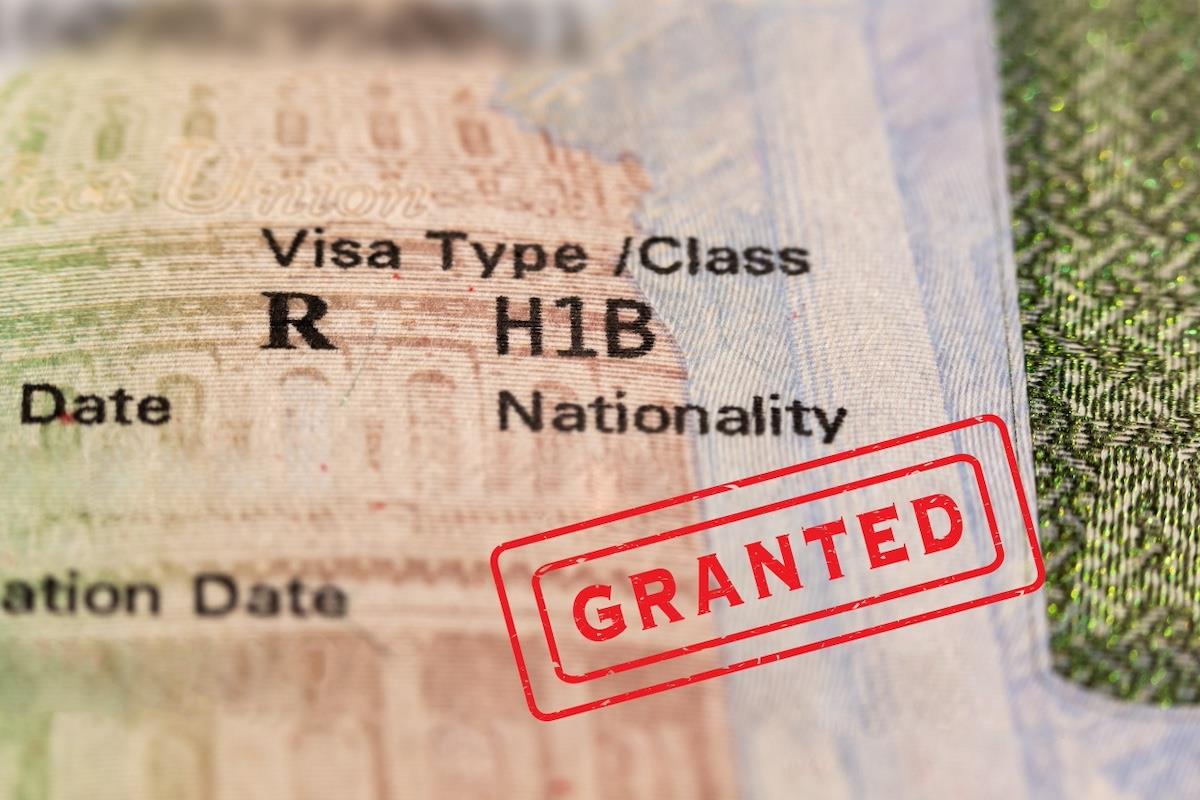
America's $100,000 talent tax vs China's free welcome mat
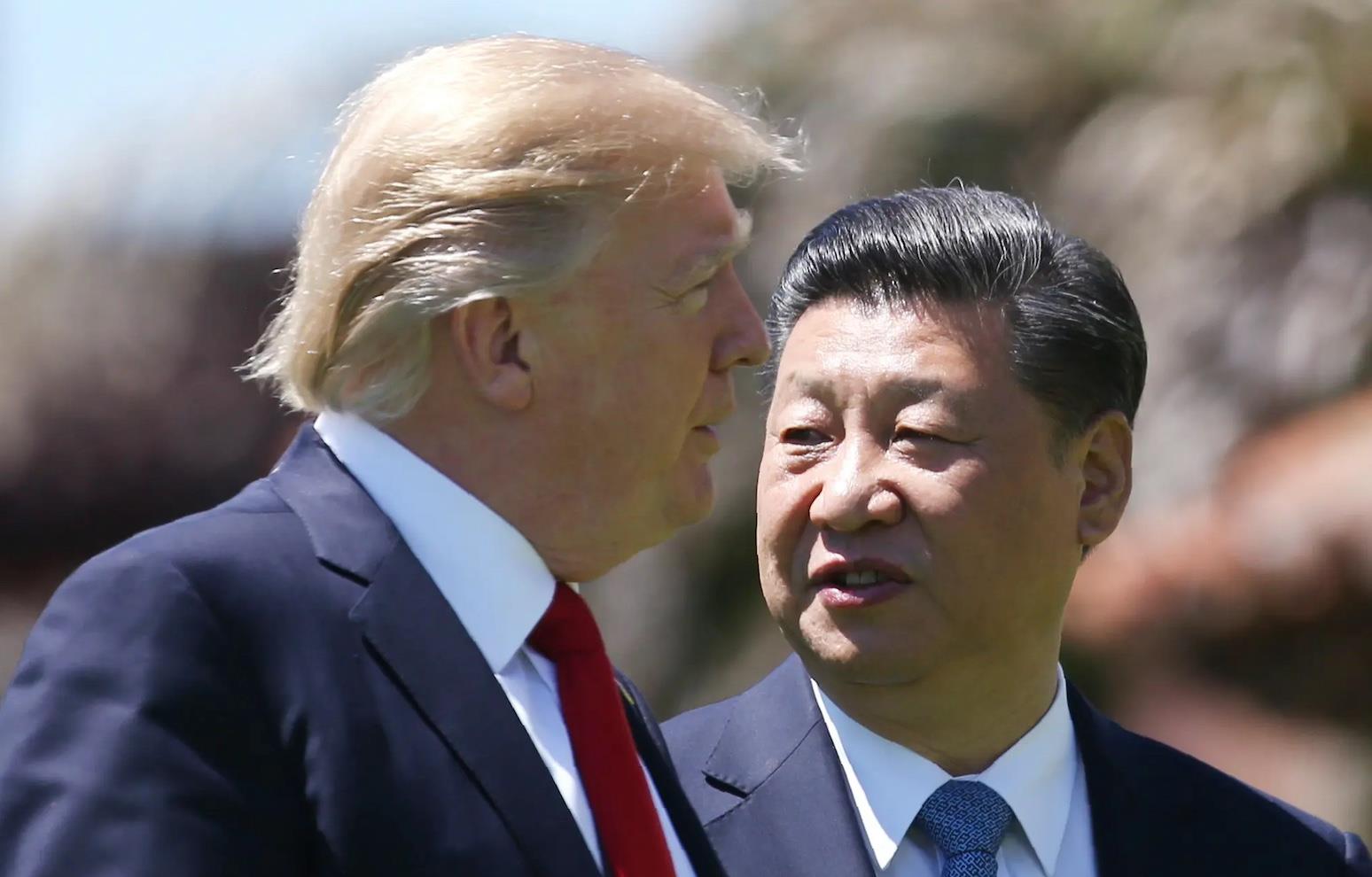
When the US cedes Asia to China

Philippines looking like next powder keg to blow in Asia
On top of all that, there's evidence that the H-1B program is great for startups. Dimmock et al. (2019) found that startups that win the H-1B lottery end up getting more VC money, patenting more, and having more successful exits.
So there's a ton of research showing that the H-1B program is very important and good for Americans. In my experience, opponents of H-1Bs tend to just dismiss this research without even looking at it, or impugn the motives of the studies' authors. They almost never seriously engage with the literature.
Occasionally one will search around and dig up a rare paper saying that H-1Bs do compete down the wages of US workers - usually Bound et al. (2017) . But Bound et al. (2017) is a structural estimation paper - it concludes that H-1B workers reduce native-born wages because it assumes away the induced investment demand mechanism by which those workers increase native-born wages.
Of course, the people pulling up the paper rarely, if ever, realize that.
The almost religious zeal with which people attack the H-1B program tells me that there's something else going on here. Oftentimes, that“something” is anti-Indian racism.
Around Christmas of last year, there was a huge battle on X between the Tech Right and the alt-right over Indian immigration. The alt-right unleashed a fiery attack on Indians, much of it directed at H-1B workers (who are about 70% Indian these days):
The Tech Right won the battle thanks to Elon Musk - himself a former H-1B worker - who threatened to“go to war on this issue the likes of which you cannot possibly comprehend.”
But the alt-right won the war, because anti-Indian hate became widespread on X . Some of the hate-posts were opportunistic trolling from Pakistan, but most were homegrown[3] the alt-right simply found Indians an easy target.
Despite Musk's attempt to protect them, Indian-Americans went onto the hard right's list of targeted groups. Once you're on that list, it's very hard to get off of it.
In fact, that shift was probably in the works for a while. During Trump's 2016 campaign, alt-right influencer Steve Bannon said the following :
Bannon's argument here is that even the highest-skilled immigrants from Asia are suspect, because they're unlikely to have America's best interests in mind.
And in 2022, right-wing law professor Amy Wax attacked Asians for leaning toward the Democratic Party:
Wax has also made many negative comments about Indians specifically.
So there was probably a roiling undercurrent of negative sentiment towards Asians, and Indians in particular, on the political right for many years. Now, with the right's political ascendance and the weakening of progressives' cultural power, the submerged anti-Indian sentiment is boiling to the surface.
To some degree, this is to be expected. Indian Americans are stunningly successful - they're the country's most elite minority, with the highest income , the most education and plenty of representation in science, politics , entrepreneurship and upper management . It was inevitable that some people in the US would envy that success, and that some would fear it.
A similar thing happened with Jews a hundred years ago. Some incumbent elites tried to shut Jews out of the Ivy League and the upper echelons of business. Others believed that Jews would not understand American values or have America's interests at heart. And still others feared that Jewish people would support each other in the business world to the exclusion of others.
You can see all of those reactions happening with regards to Asians today - and especially to Indians. Famously discriminatory practices at the Ivies have worked to keep Asian numbers down (something that right-wingers have actually fought against). The alt-right thinks of Indians as resident aliens, conspiring for their own profit at the expense of the nation.
And as for self-dealing and ethnic exclusivity, I'm starting to hear this charge thrown around a lot as well, on social media and even in some San Francisco parties.[4] The X user“Power Bottom Dad”, a harsh critic of H-1Bs, has identified at least two lawsuits in which a big American company was accused of preferentially hiring Indians or discriminating against US citizens .
Whether that is a general pattern, as Power Bottom Dad asserts, or a couple of isolated incidents that could be found from time to time among any ethnic group in America, is probably irrelevant to the politics of the issue; what matters is that there is a portion of Americans out there who see Asian immigrants, and particularly Indian immigrants, as a clannish self-dealing cartel.
The other notorious backlash against an immigrant elite in America, of course, was the Japanese internment during World War 2. Although officially about preventing Japanese Americans from turning traitor, the internment also allowed opportunistic white California farmers to push their Japanese competitors out of the market.
We haven't seen anything like that yet with Indians, Koreans, or other Asian groups, but if there's a conflict with China while Trump is President, we could see persecution of Chinese people.
But anyway, while figures like Amy Wax and Steve Bannon are odious, I'm actually slightly sympathetic to the fear of a demographic turnover among the elite. The number of slots for elite politicians, businesspeople, and academics in America is fairly constant, so it does become a zero-sum competition.
It's natural to be afraid of getting pushed out of that elite by hard-charging immigrants who were selected for their genius - and also by ethnic cartelization to monopolize the elite.
The price of that fear, however, is simply very high. This is not the 19th century; America has low birthrates among its elite (and in general), so it can't replenish its elite through reproduction. Instead, if we want to keep having the world's best engineers and researchers and such, we need to import some of them.
Cut off that flow, and Americans will discover why a country with only 4% of the world's population can't remain the center of global research and development without a lot of skilled immigration.
On top of that, Trump's poor treatment of Indian H-1B workers and Korean construction workers will end up weakening America's alliances - and economic relationships - with those two Asian countries. Weakened alliances in Asia will make it nearly impossible for the US to effectively resist the encroachment of Chinese power.
So right-wing fears of an Asian-led America are going to end up making the actual America poorer and less globally relevant. Personally, I don't think that tradeoff is worth it. Demographic change among the elite can be unsettling, but not as unsettling as the collapse of America's global power and domestic economic dynamism.
We've dealt with a changing elite before, and it worked out fine; we can do it again.
Notes1 Or O-1 visas, which can be renewed infinitely and thus act a little bit like a green card.
2 It will also be a vehicle for corruption, since - like many of Trump's policies - the $100,000 fee can be suspended at the President's discretion.
3 I even heard a second-hand anecdote about a rich right-wing guy who maintains a huge army of anti-Indian hate bots to post on X and other social media sites.
4 Of course, these parties included plenty of Indians.
This article first appeared on Noahpinion Substack and is republished with permission. Read the original here .
Sign up here to comment on Asia Times stories Or Sign in to an existing accoun
Thank you for registering!
An account was already registered with this email. Please check your inbox for an authentication link.

Sign up for one of our free newsletters
-
The Daily Report
Start your day right with Asia Times' top stories
AT Weekly Report
A weekly roundup of Asia Times' most-read stories
-
Click to share on X (Opens in new window)
X
Click to share on LinkedIn (Opens in new window)
LinkedIn
Click to share on Facebook (Opens in new window)
Facebook
Click to share on WhatsApp (Opens in new window)
WhatsApp
Click to share on Reddit (Opens in new window)
Reddit
Click to email a link to a friend (Opens in new window)
Email
Click to print (Opens in new window)
Print

Legal Disclaimer:
MENAFN provides the
information “as is” without warranty of any kind. We do not accept
any responsibility or liability for the accuracy, content, images,
videos, licenses, completeness, legality, or reliability of the information
contained in this article. If you have any complaints or copyright
issues related to this article, kindly contact the provider above.


















Comments
No comment